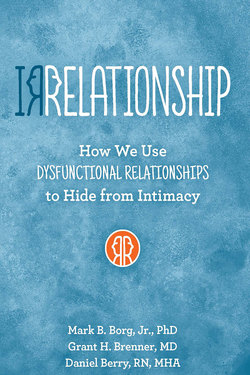Читать книгу IRRELATIONSHIP: How we use Dysfunctional Relationships to Hide from Intimacy - Mark B. Borg - Страница 9
На сайте Литреса книга снята с продажи.
ОглавлениеForeword Foreword
The basic premise of this book—that many people looking for love, or those who believe they have already found it, unwittingly create dysfunctional relationships as a way of keeping true intimacy at arm’s length—reflects a fact that marriage and family therapists see day after day in their offices and that many “civilians” just soldier through day after disappointing day. Rarely, however, does anyone ever articulate the phenomenon with such simplicity and clarity or label it so tellingly—irrelationship. So this book arrives as a needed blast of fresh air, to advance everyone’s understanding of how people can yearn for love, even make sacrifices for it, and still feel distant from a partner and deeply unsatisfied.
People construct irrelationships because intimacy can be tough work. It’s for grown-ups, definitely not for wimps. It is liberating, once attained, but getting there can be anxiety provoking. To achieve intimacy, to be open to it, takes courage. We have to be able to drop our defenses, often deeply ingrained, and stand naked to ourselves, exposing the primal fear that we are flawed and unlovable. Small wonder we often have strong psychological defenses against it. Yet there is no elixir as great as deeply connecting with another human being.
Just who is candidate for an irrelationship? There’s no way to judge by external markers. As the authors explain, much depends on the way each of us was exposed to love when young; the “rules” we inferred or explicitly learned long before we knew we were absorbing them, to say nothing of how they might shape our lives; and our tolerance for discomfort. Couples can be locked into patterns of mutual deception for years, living a so-called counterfeit connection. While our early understandings and adaptations may have served us very well in the situations in which we were raised, they can keep us from getting what, as adults in new circumstances, we most want. It is an axiom of psychology that the greatest obstacle in our way is often…ourselves.
The authors of this book bring together a great deal of information from many areas of psychology and psychiatry, along with years of practical experience, to help people understand how they get into irrelationships, how such relationships can take on a life of their own, and how it is possible to break free and create a real relationship. You, reader, are in good hands.
Hara Estroff Marano
Editor at Large, Psychology Today
